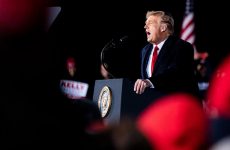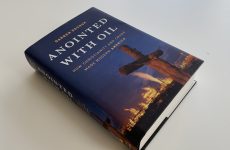
The Seventh day Adventist Church has been tasked with a very specific mission. That mission, detailed in Revelation 14:6-12, was designed to rescue God’s people out of Babylon. Since its inception, the Spirit of Prophecy, illustrating the prophetic voice of the church, has spoken boldly and loudly regarding the fallen religious system of Roman Catholicism, and the work that would be done by apostate Protestantism in seeking to enforce religious dogma worldwide.
But something strange is happening to the prophetic voice within Adventism. In light of the events unfolding here in America, the prophetic warning has been significantly muted, and replaced with warnings identical to the very powers we were warned about in the books of Daniel and Revelation.
I became a Christian and an Adventist in 1994, shortly after one Bible study on Daniel 7. Since then I have had the privilege of preaching and teaching this prophetic message around the world. Strangely, though, that same message is no longer welcomed in many circles of the church. In its place we are now hearing pleas from Adventists that our nation needs to return to “Judeo-Christian” values; that the separation of church and state is a myth not supported by the Constitution; that the true threat to America is secular and medical “tyranny,” Communism, and socialism; that global secular elites are plotting a sinister plan to overthrow American democracy; and that addressing issues such as racism, poverty, and other injustices in connection with the gospel is nothing more than “wokeism.”
We are now experiencing a devastating and stunning silence regarding the rise of Christian nationalism.
So how did we get here? How did we get to where our prophetic voice has shifted so significantly that it often now mutes the warning of the third angel’s message against the beast and its image, specifically Roman Catholic papacy and apostate Protestantism? I believe the answer lies in what I have come to term prophetic denialism or revisionism, particularly regarding the second beast of Bible prophecy.
A common prophetic error I often hear repeated is that the second beast of Bible prophecy, described as having horns like a lamb, willone day in the future speak like a dragon. This concept, however, is a denial of and misinterpretation of what the Bible actually says. This beast does not first speak as a lamb. It never speaks as a lamb. It speaks only as a dragon, and it does so from its inception. This denial (or revision) of the second beast has led many Seventh-day Adventists to become comfortable with actually uniting with the beast they should be opposing.
This last point reveals a second error. Many who read that last paragraph may be tempted to think that I am denigrating America. I am not. The beast that rises from the earth doesn’t represent America in and of itself. It is more specifically speaking of the Protestant element within America. Hence, it is a reference to apostate Protestantism within America, and not America itself. When we say “America” in prophecy, what we should be identifying is apostate Protestantism within America. As Ellen White states: “The Protestants of the United States will be foremost in stretching their hands across the gulf to grasp the hand of spiritualism; they will reach over the abyss to clasp hands with the Roman power; and under the influence of this threefold union, this country will follow in the steps of Rome in trampling on the rights of conscience.”1 Failure to recognize this difference leads many to the erroneous view that preaching such a message means that the preacher doesn’t appreciate the blessing God has poured out on this nation and the bulwark of religious freedom that it has been.
But while we shouldn’t deny the good within this nation, neither are we to deny the prophetic fact that from its inception, Protestantism has fulfilled the very description of appearing lamblike yet speaking like a dragon. Ellen White speaks to this when she writes, “It was the desire for liberty of conscience that inspired the Pilgrims to brave the perils of the long journey across the sea, to endure the hardships and dangers of the wilderness, and with God’s blessing to lay, on the shores of America, the foundation of a mighty nation. Yet honest and God-fearing as they were, the Pilgrims did not yet comprehend the great principle of religious liberty. The freedom which they sacrificed so much to secure for themselves, they were not equally ready to grant to others. ‘Very few, even of the foremost thinkers and moralists of the seventeenth century, had any just conception of that grand principle, the outgrowth of the New Testament, which acknowledges God as the sole judge of human faith.’—Martyn, vol. 5, p. 297. The doctrine that God has committed to the church the right to control the conscience, and to define and punish heresy, is one of the most deeply rooted of papal errors. While the Reformers rejected the creed of Rome, they were not entirely free from her spirit of intolerance. The dense darkness in which, through the long ages of her rule, popery had enveloped all Christendom, had not even yet been wholly dissipated. Said one of the leading ministers in the colony of Massachusetts Bay: ‘It was toleration that made the world antichristian; and the church never took harm by the punishment of heretics.’—Ibid., vol. 5, p. 335. The regulation was adopted by the colonists that only church-members should have a voice in the civil government. A kind of state church was formed, all the people being required to contribute to the support of the clergy, and the magistrates being authorized to suppress heresy. Thus the secular power was in the hands of the church. It was not long before these measures led to the inevitable result—persecution.”2
The temptation for many Seventh-day Adventists is to think that while some bad things may have happened in the past, the beast is no longer speaking as a dragon.
While we may thank God for the Declaration of Independence and the Constitution, we must remember the hypocrisy of slavery, perpetrated mostly by professed lamblike Christians. It was this very hypocrisy that led our pioneers to make statements such as these: “The two-horned beast appears in two phases—with the gentleness of a lamb and the fierceness of the dragon. This has, to some extent, already been shown, in the inconsistency of sending forth to the world the doctrine of the equality of all men in respect to natural rights—the right to life, liberty, and the pursuit of happiness—and upholding by law all the evils of American slavery. Also, by professing to grant the privilege to all to worship God according to the dictates of their own consciences, and then persecuting the Baptists and Quakers for following their conscientious convictions. But this will be shown more fully in the future, when Congress shall be called upon to make laws concerning religion.”3
“But as John viewed this matter, the scene is sadly degenerate when the beast begins to act. Instead of carrying out his lamb-like profession, ‘he speaks as a dragon.’ Yes, that very national executive body, who have before them this Declaration of Independence, and profess to be carrying out its principles, can pass laws by which 3,200,000 slaves can be held in bondage. The Declaration of Independence was professedly based on self-evident truths. [Truths that needed no reasoning to establish them.] But it is a self-evident truth now that a large number of our race are born into slavery. To produce a harmony between our laws and their professed basis, the Declaration of Independence should have a clause supplied, and should read, All men are created equal except 3,200,000. As things exist in our Union at present, we can look upon the above as only a lamb-like profession, while the action [voice, or laws of the government] is dragon-like.”4
Today this prophetic teaching from the history of the United States would be seen by many Seventh-day Adventists as nothing more than “critical race theory” or “wokeism.” In turn, many Adventists are now denying this prophecy, revising it to mean something foreign from the text. Yet note this: “We say we bid all reforms, God speed! but some are laboring for reforms which they never will see accomplished. As much as any one, from our very soul we detest and abhor that foul blot of our country—slavery! and our sympathies are with those in whose hearts burns the love of freedom, and who would desire to see the bondman loosed from his chains. But he who expects to see the land freed entirely from this curse, or even to see slavery contentedly confine itself within certain limits, we can but regard as laboring under a false hope; for the character which the prophetic pencil has given to the two-horned beast, [Revelation 13:11] a symbol of our country, is that he shall speak as a dragon! Not that slavery alone constitutes the dragon voice; but we must take with it its prime mover, that infernal spirit that is even now, on the plains of Kansas, burning the homes of freemen to the ground, and driving out their inmates robbed and insulted, and which but recently prompted a brutal assault upon a senator in the very halls of congress. Prophecy gives us no ground to hope for reform here: the beast speaks like a dragon. People may caress him never so fondly, or threaten him never so fiercely; they cannot reform his mouth: he will speak like a dragon still. The prophecy does not say that at first he spake like a dragon, but at length reformed his speech, and breathed forth a just and Christ-like spirit. His future history presents no redeeming feature. He will continue to bellow forth his dragon voice, till he shall be cast into the burning flame, and the remnant whom he will persecute shall take their stand of victory on Mount Zion with the Lamb.”5
We must understand that while America as a nation has advanced, the beast (apostate Protestantism) is what it is. It spoke as a dragon by tolerating and endorsing slavery in the South. And when that was abolished, it spoke as a dragon through chain gangs. And when those were done away with, it spoke as a dragon through segregation. And when that was outlawed, it spoke as a dragon through redlining and redistricting. Of course, this is not to say that all Protestants fall into this category. Many Protestants, God’s people (Revelation 18), were responsible for fighting against the tyranny of the beast, overturning through legislative action the dictates of the beast. We should not forget their heroism. But the temptation for many Seventh-day Adventists is to think that while some bad things may have happened in the past, the beast is no longer speaking as a dragon. This is evidently false. The beast’s dialect changes. Its voice does not. It is still speaking to today, but many Adventists have become deaf to it.
Denying that the beast has always spoken like a dragon positions us to embrace that beast and its ideology. Since the beast has not yet begun to speak like a dragon, the thinking goes, then it is appropriate to embrace the beast until it does. Make friends now with the beast, some say. But it doesn’t stop there. What we see now is that many Seventh-day Adventists have no issue pointing out and calling out the first beast of Bible prophecy, but take great offense if the second beast of Bible prophecy is accurately described. And so we are now experiencing a devastating and stunning silence regarding the rise of Christian nationalism. When our voice should be the loudest warning of this danger, this work is being largely left to secularists and atheists who clearly see this danger, yet are totally unaware that the Bible, the very book they see as a book of fables, foretold this development thousands of years in advance. Silence now is a dereliction of duty.
Today this prophetic teaching from the history of the United States would be seen by many Seventh-day Adventists as nothing more than “critical race theory” or “wokeism.”
In embracing apostate Protestantism as partners against secularism and socialism, many have, in essence, been buying into their ideology. In their version of prophecy, the enemies to be feared are Communists, socialists, global elites, and secularists who desire nothing more than a secular, one-world government. Of course, to hold on to what we think is the three angels’ messages, we add an anti-papal component into the mix to give our position an Adventist flavor, but the wine is still Babylon’s. And that wine distorts our prophetic voice. We imbibe the wine of Babylon while claiming to hate the bartender.
Today as I note the deafening silence of Adventist voices speaking up about the prophesied rise of Christian nationalism, along with acceptance of new “prophetic voices” of political personalities replacing our old prophetic voice, I can only appeal to the church to urgently stand on the Word of God. As I watch the same spirit of the dragon that has energized, in the name of Christ, a spirit of rebellion, anger, and suspicion in Christian nationalists today, causing them to excuse violence in the name of Christ and view insurrection as a good and noble thing, I can’t help thinking of Christ’s words: “The time cometh, that whosoever killeth you will think that he doeth God service” (John 16:2, KJV). As I watch this same spirit enter our church, causing polarization, and separation, I can’t help but think of the warning we were given regarding the shaking and final apostasy of many of our people. The words are a fitting warning for all who would heed it.
“As the storm approaches, a large class who have professed faith in the third angel’s message, but have not been sanctified through obedience to the truth, abandon their position, and join the ranks of the opposition. By uniting with the world and partaking of its spirit, they have come to view matters in nearly the same light; and when the test is brought, they are prepared to choose the easy, popular side. Men of talent and pleasing address, who once rejoiced in the truth, employ their powers to deceive and mislead souls. They become the most bitter enemies of their former brethren. When Sabbathkeepers are brought before the courts to answer for their faith, these apostates are the most efficient agents of Satan to misrepresent and accuse them, and by false reports and insinuations to stir up the rulers against them.”6
What will lead those of pleasing address to unite with the beast of apostate Protestantism to stand against Adventists? Viewing matters in the same light presented by said beast.
My appeal to my church is that we return to the unadulterated preaching of the three angels’ messages, not to bash Roman Catholics or Protestants, but to call them out of a false system. The longer we wait to do this, thinking that we will only do this once the beast “starts to speak like a dragon,” the more we will have to answer for before God.
Ivor Myers is the speaker and director of Power of the Lamb Ministries. He also co-hosts with his wife the 3ABN series “Battles of Faith.”
1 Ellen G. White, The Great Controversy (Mountain View, Calif.: Pacific Press Pub. Assn., 1911), p. 588. (Italics supplied.)
2 Ibid., pp. 292, 293. (Italics supplied.)
3 Ellen G. White, The Spirit of Prophecy (Battle Creek, Mich.: Review and Herald Pub. Assn., 1884), vol. 4, p. 502. (Italics supplied.)
4 John N. Loughborough, The Two-horned Beast of Revelation 13, a Symbol of the United States (1857), p. 29.
5 “True Reforms and Reformers,” Review and Herald, June 26, 1856. (Last two sentences, italics supplied.)
6 E. G. White, The Great Controversy, p. 608. (Italics supplied.)



